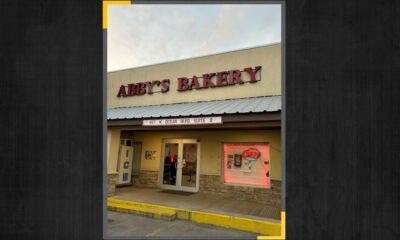Mississippi Today
Two Delta health centers awarded competitive federal grant for maternal care


Two federally qualified health centers in the Delta will receive a total of $3.6 million over four years from the federal government to expand and strengthen their maternal health services.
Federally qualified health centers are nonprofits that provide health care to under-insured and uninsured patients and receive enhanced reimbursement from Medicare and Medicaid. They offer a sliding fee scale for services for patients.
Delta Health Center, with 17 locations throughout the Delta, and G.A. Carmichael Family Health Center, with six locations across central Mississippi, beat out applicants from several southeastern and midwestern states.
Two organizations in Tennessee and one in Alabama were also awarded funding this year.
The grant is focused on improving access to perinatal care in rural communities in the greater Delta region – which includes 252 counties and parishes within the eight states of Alabama, Arkansas, Illinois, Kentucky, Louisiana, Mississippi, Missouri and Tennessee, according to the Health Resources and Services Administration (HRSA).
It’s the first of its kind in terms of goal and region, said HRSA Administrator Carole Johnson.
“We have not had a targeted maternal health initiative for the Delta before this program,” Johnson told Mississippi Today. “We’ve had a national competition for rural areas focused on maternal health, but what we were able to do here, in partnership with congressional leaders from the Delta region, was secure some resources that would go directly to the Delta region to be able to address this very important need.”
Johnson said Mississippi applicants stood out because of their ability to identify the most pressing issues facing mothers and babies.
“What we saw from the applicants and awardees in Mississippi was a real commitment to prenatal care and early engagement in prenatal care, reducing preterm births, as well as expanding access to midwives and community-based doula services,” she said. “And all of those pieces together really resonate with the ways we’ve been looking at how to address maternal health services.”
At G.A. Carmichael Family Health Center, the funds will be directed mainly to expanding services in the three Delta counties in which the center has clinics – Humphreys, Yazoo and Leflore.
Yazoo and Humphreys counties are maternity care deserts – meaning they have no hospitals providing obstetric care, no OB-GYNs and no certified nurse midwives – and Greenwood Leflore Hospital closed its labor and delivery unit in 2022. While OB-GYNs still practice in Leflore County, mothers have to travel outside of it to deliver their babies.
Solving the transportation issue will be a top priority, according to the center’s CEO James L. Coleman Jr.
“We have situations where mothers have to travel 100 or so miles just for maternal health care,” Coleman said. “Especially in times of delivery, especially in times of emergency, that is unacceptable.”
Health care deserts pervade Mississippi, where 60% of counties have no OB-GYN and nearly half of rural hospitals are at risk of closing.
Inadequate access to prenatal care has been linked to preterm births, in which Mississippi leads the nation. Preterm births can lead to chronic health problems and infant mortality – in which Mississippi also ranks highest.
That’s why Delta Health Center is committed to using its funds to work together with affiliated organizations – including Delta Health System; Northwest Mississippi Regional Medical Center; Aaron E. Henry Community Health Center; and Converge – to “move the dial” on maternal health indicators across the Delta region, said John Fairman, the center’s CEO.
“We face many challenges including the recruitment and retention of OB-GYNs to the area,” Fairman said, “and will be exploring models of care that are being implemented in other areas of the country that can be adopted to provide greater access and efficiencies for perinatal health care – with the overall goal of significantly decreasing rates of low birthweight and preterm birth in the Delta.”
The United States currently has the highest rate of maternal deaths among high-income countries, and Johnson said this grant is part of a continued effort from the Biden administration to change that.
“The president and the vice president have made maternal health a priority since day one and have really called on all of us across the Department of Health and Human Services to lean in and identify where we can put resources and policy,” Johnson said. “One death is one death too many.”
This article first appeared on Mississippi Today and is republished here under a Creative Commons license.![]()
Mississippi Today
On this day in 1956

Feb. 24, 1956

U.S. Sen. Harry F. Byrd Sr. coined the term “Massive Resistance” to unite white leaders in Virginia in their campaign to preserve segregation. The policy appealed to white Virginians’ racial views, their fears and their disdain for federal “intrusion” into the “Southern way of life.”
Virginia passed laws to deny state funds to any integrated school and created tuition grants for students who refused to attend these schools. Other states copied its approach.
When courts ordered desegregation in several schools in Charlottesville and Norfolk, Virginia Gov. James Lindsay Almond Jr. ordered those schools closed. When Almond continued that defiance, 29 of the state’s leading businessmen told him in December 1958 that the crisis was adversely affecting Virginia’s economy. Two months later, the governor proposed a measure to repeal the closure laws and permit desegregation.
On Feb. 2, 1959, 17 Black students in Norfolk and four in Arlington County peacefully enrolled in what had been all-white schools.
This article first appeared on Mississippi Today and is republished here under a Creative Commons license.![]()
Mississippi Today
If Tate Reeves calls a tax cut special session, Senate has the option to do nothing

An illness is spreading through the Mississippi Capitol: special session fever.
Speculation is rampant that Gov. Tate Reeves will call a special session if the Senate does not acquiesce to his and the House leadership’s wishes to eliminate the state personal income tax.
Reeves and House leaders are fond of claiming that the about 30% of general fund revenue lost by eliminating the income tax can be offset by growth in other state tax revenue.
House leaders can produce fancy charts showing that the average annual 3% growth rate in state revenue collections can more than offset the revenue lost from a phase out of the income tax.
What is lost in the fancy charts is that the historical 3% growth rate in state revenue includes growth in the personal income tax, which is the second largest source of state revenue. Any growth rate will entail much less revenue if it does not include a 3% growth in the income tax, which would be eliminated if the governor and House leaders have their way. This is important because historically speaking, as state revenue grows so does the cost of providing services, from pay to state employees, to health care costs, to transportation costs, to utility costs and so on.
This does not even include the fact that historically speaking, many state entities providing services have been underfunded by the Legislature, ranging from education to health care, to law enforcement, to transportation. Again, the list goes on and on.
And don’t forget a looming $25 billion shortfall in the state’s Public Employee Retirement System that could create chaos at some point.
But should the Senate not agree to the elimination of the income tax and Reeves calls a special session, there will be tremendous pressure on the Senate leadership, particularly Lt. Gov. Delbert Hosemann, the chamber’s presiding officer.
Generally speaking, a special session will provide more advantages for the eliminate-the-income-tax crowd.
First off, it will be two against one. When the governor and one chamber of the Legislature are on the same page, it is often more difficult for the other chamber to prevail.
The Mississippi Constitution gives the governor sole authority to call a special session and set an agenda. But the Legislature does have discretion in how that agenda is carried out.
And the Legislature always has the option to do nothing during the special session. Simply adjourn and go home is an option.
But the state constitution also says if one chamber is in session, the other house cannot remain out of session for more than three days.
In other words, theoretically, the House and governor working together could keep the Senate in session all year.
In theory, senators could say they are not going to yield to the governor’s wishes and adjourn the special session. But if the House remained in session, the Senate would have to come back in three days. The Senate could then adjourn again, but be forced to come back if the House stubbornly remained in session.
The process could continue all year.
But in the real world, there does not appear to be a mechanism — constitutionally speaking — to force the Senate to come back. The Mississippi Constitution does say members can be “compelled” to attend a session in order to have a quorum, but many experts say that language would not be relevant to make an entire chamber return to session after members had voted to adjourn.
In the past, one chamber has failed to return to the Capitol and suffered no consequences after the other remained in session for more than three days.
As a side note, the Mississippi Constitution does give the governor the authority to end a special session should the two chambers not agree on adjournment. In the early 2000s, then-Gov. Ronnie Musgrove ended a special session when the House and Senate could not agree on a plan to redraw the state’s U.S. House districts to adhere to population shifts found by the U.S. Census.
But would Reeves want to end the special session without approval of his cherished income tax elimination plan?
Probably not.
In 2002 there famously was an 82-day special session to consider proposals to provide businesses more protection from lawsuits. No effort was made to adjourn that session. It just dragged on until the House finally agreed to a significant portion of the Senate plan to provide more lawsuit protection.
In 1969, a special session lasted most of the summer when the Legislature finally agreed to a proposal of then-Gov. John Bell Williams to opt into the federal Medicaid program.
In both those instances, those wanting something passed — Medicaid in the 1960s and lawsuit protections in the 2000s — finally prevailed.
This article first appeared on Mississippi Today and is republished here under a Creative Commons license.![]()
Mississippi Today
On this day in 1898

Feb. 22, 1898

Frazier Baker, the first Black postmaster of the small town of Lake City, South Carolina, and his baby daughter, Julia, were killed, and his wife and three other daughters were injured when a lynch mob attacked.
When President William McKinley appointed Baker the previous year, local whites began to attack Baker’s abilities. Postal inspectors determined the accusations were unfounded, but that didn’t halt those determined to destroy him.
Hundreds of whites set fire to the post office, where the Bakers lived, and reportedly fired up to 100 bullets into their home. Outraged citizens in town wrote a resolution describing the attack and 25 years of “lawlessness” and “bloody butchery” in the area.
Crusading journalist Ida B. Wells wrote the White House about the attack, noting that the family was now in the Black hospital in Charleston “and when they recover sufficiently to be discharged, they) have no dollar with which to buy food, shelter or raiment.
McKinley ordered an investigation that led to charges against 13 men, but no one was ever convicted. The family left South Carolina for Boston, and later that year, the first nationwide civil rights organization in the U.S., the National Afro-American Council, was formed.
In 2019, the Lake City post office was renamed to honor Frazier Baker.
“We, as a family, are glad that the recognition of this painful event finally happened,” his great-niece, Dr. Fostenia Baker said. “It’s long overdue.”
This article first appeared on Mississippi Today and is republished here under a Creative Commons license.![]()
-

 News from the South - Louisiana News Feed3 days ago
News from the South - Louisiana News Feed3 days agoJeff Landry’s budget includes cuts to Louisiana’s domestic violence shelter funding
-

 News from the South - North Carolina News Feed3 days ago
News from the South - North Carolina News Feed3 days agoBills from NC lawmakers expand gun rights, limit cellphone use
-

 News from the South - Texas News Feed4 days ago
News from the South - Texas News Feed4 days agoICE charges Texas bakery owners with harboring immigrants
-

 News from the South - Oklahoma News Feed6 days ago
News from the South - Oklahoma News Feed6 days agoRemains of Aubrey Dameron found, family gathers in her honor
-

 News from the South - South Carolina News Feed7 days ago
News from the South - South Carolina News Feed7 days agoSC Flu cases on the rise: Prisma Health Doctors speak out on how to spot symptoms, get treatment
-

 News from the South - Florida News Feed6 days ago
News from the South - Florida News Feed6 days agoTrump says AP will continue to be curtailed at White House until it changes style to Gulf of America
-

 Mississippi Today7 days ago
Mississippi Today7 days agoMississippi could face health research funding cuts under Trump administration policy
-

 News from the South - Texas News Feed6 days ago
News from the South - Texas News Feed6 days agoTexas Senate bill would give teachers raises, free pre-K













































